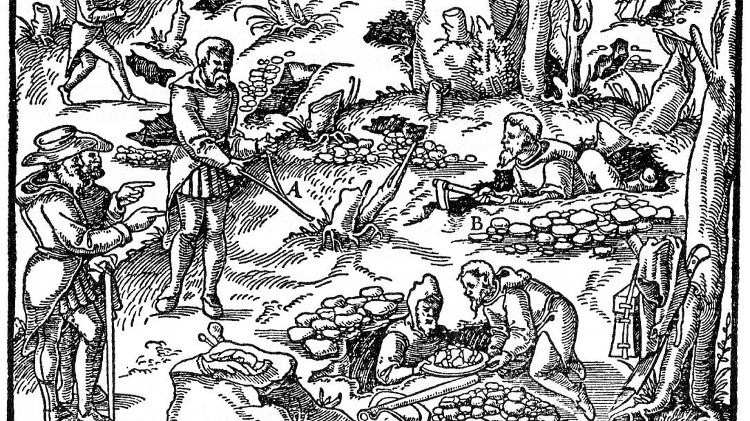In response to a burgeoning coal mining industry expanding along the Scottish coast (pictured) in the 1600s, the country passed laws making it easier for mine owners to buy, sell and inherit workers as slaves. Steve Kieretsu/Wikimedia
Scotland’s Parliament passed a landmark ruling in 1701 that protected citizens against wrongful imprisonment and undue delays in trials, now known as the ‘Scotch Habeas Corpus Act.’ While a victory for most Scots, the law explicitly stated that those rights were “in no ways to be extended to colliers or salters.”
The exclusion would not have shocked workers in Scottish coal-mines and salt-pans, who had suffered acute discrimination and injustice for nearly 100 years; author Sir Walter Scott accurately referred to them as “slaves of the soil” in one of his novels.
Coal miners would have to wait another century to be awarded basic freedoms and the right to a fair trial.
Back in 1606, an Act of Scottish parliament had made it an offense for anyone to hire a salter or a collier without a testimonial from their current employer. Essentially, it authorized a coal mine owner to retain his workers for as long as he wanted. Workers thus became a key piece of mining equipment that could be bought, bartered, sold and inherited. Colliers were sold along with collieries, and valuations for the human chattel were often detailed separately in a sale. According to an account of an early 19th-century mining engineer, one coal miner explained post-emancipation that he had been “niffered [traded] for a pony.”
Children were bound to the same serfdom as their parents, provided that the landlord bestowed a gift, or “gave arles” to the parents. The acceptance of the token served as a binding contract of the child’s lifelong future employment.
If a worker attempted to escape or find new employment, masters could reclaim them by force. Anyone hiring an escaped collier would have to surrender the man and pay a £100 penalty to the wronged mine owner.
The 1606 law was in response to a burgeoning coal mining industry expanding across the Scottish coast. Dross coal was needed to provide heat in the process of extracting salt from sea-water. Coal mines appeared alongside salt-pans, which is why salters were subject to the same discriminatory laws as their associates in the mines.
Salt-making was often a continuous operation and required a regular supply of coal. Initially coal was combed off the surface of the earth, but as these bodies were exhausted, mines became deeper and more complex. Coal mining became a specialized profession.
As new coal mines opened to meet the demand for salt from home and abroad, owners tried to poach experienced coal miners from their neighbours, enticing them with promises of higher wages and gifts. Coal miners were social outcasts engaged in grimy, harsh work and it was hard to attract new men to the tough industry. The 1606 Act was borne out of petitions from aggrieved coal mine owners losing their workers.
In 1661 new Scottish legislation expanded the scope of the 1606 Act to apply its restrictions to an increased range of occupations within coal mining. It extended its provisions to the “lavers and drawers of water at the cast heugh [shaft] head and gatesman who work the ways and passages.” The catalogue of different roles listed in the legislation demonstrates the industry’s increased sophistication and organization. Men were now specialized by task, whether it was pumping water, winding coal up shafts or attending to the repair of underground roads.
The same Act decreed that workers must work six days a week, except for at Christmas time. For any day they did not work, it cost a “paine of twentie shillings Scots, to be paid to the masters.” The law clarified that bosses could also administer physical punishment to those who missed a day of work.
Just ten years later, a new law decreed that coal-owners and salt-masters could “seize upon any vagabonds and beggars wherever they can find them,” and put them to work for free.
The process of emancipation for colliers and salters did not occur until 1775, nearly 70 years after the union of Scotland and England. A new British law decreed that new employees in mines and salt operations were to be “free labourers,” who could benefit from the Habeas Corpus Act. However, it included a pernicious grandfather clause, which stated that existing workers would not be afforded the same freedoms.
The complete emancipation of miners and salters in Scotland did not occur until 1799 and was motivated by profit, as mines were still having trouble obtaining and retaining workers. Men did not show up for work, left their employers illegally, and joined the army and navy.
While lifelong serf miners did not exist on the same scale anywhere else in the United Kingdom, coal miners in Durham and Northumberland in northern England were bound by a yearly ‘miners bond’ to their colliery. If they broke the bond, they would be subject to arrest, trial and imprisonment. The much-hated practice was abolished in 1872.




